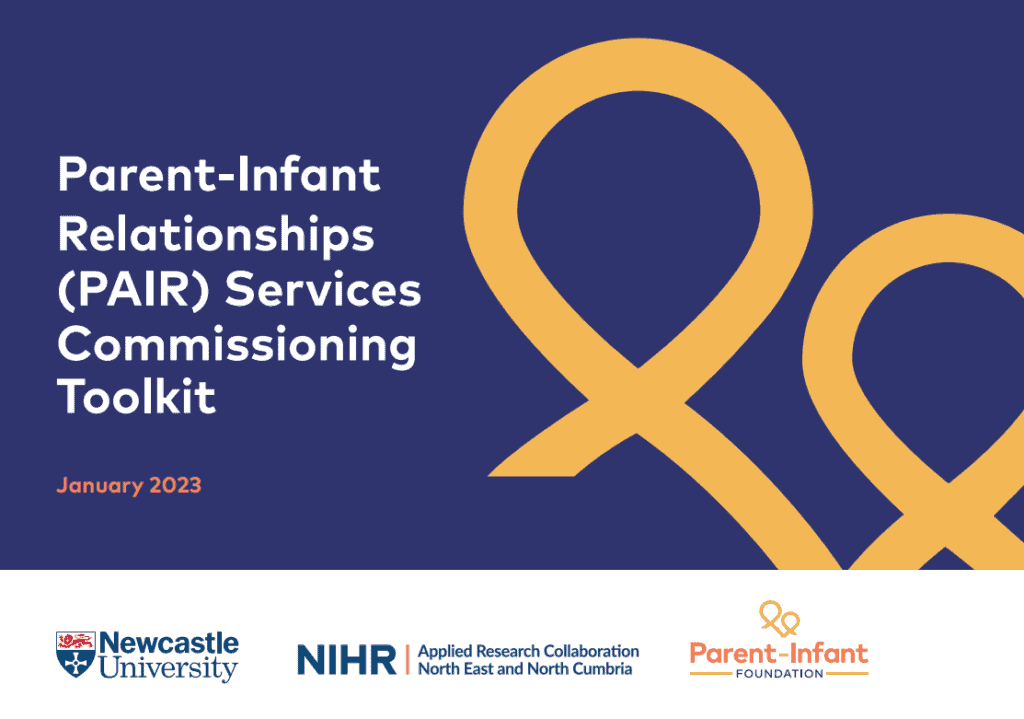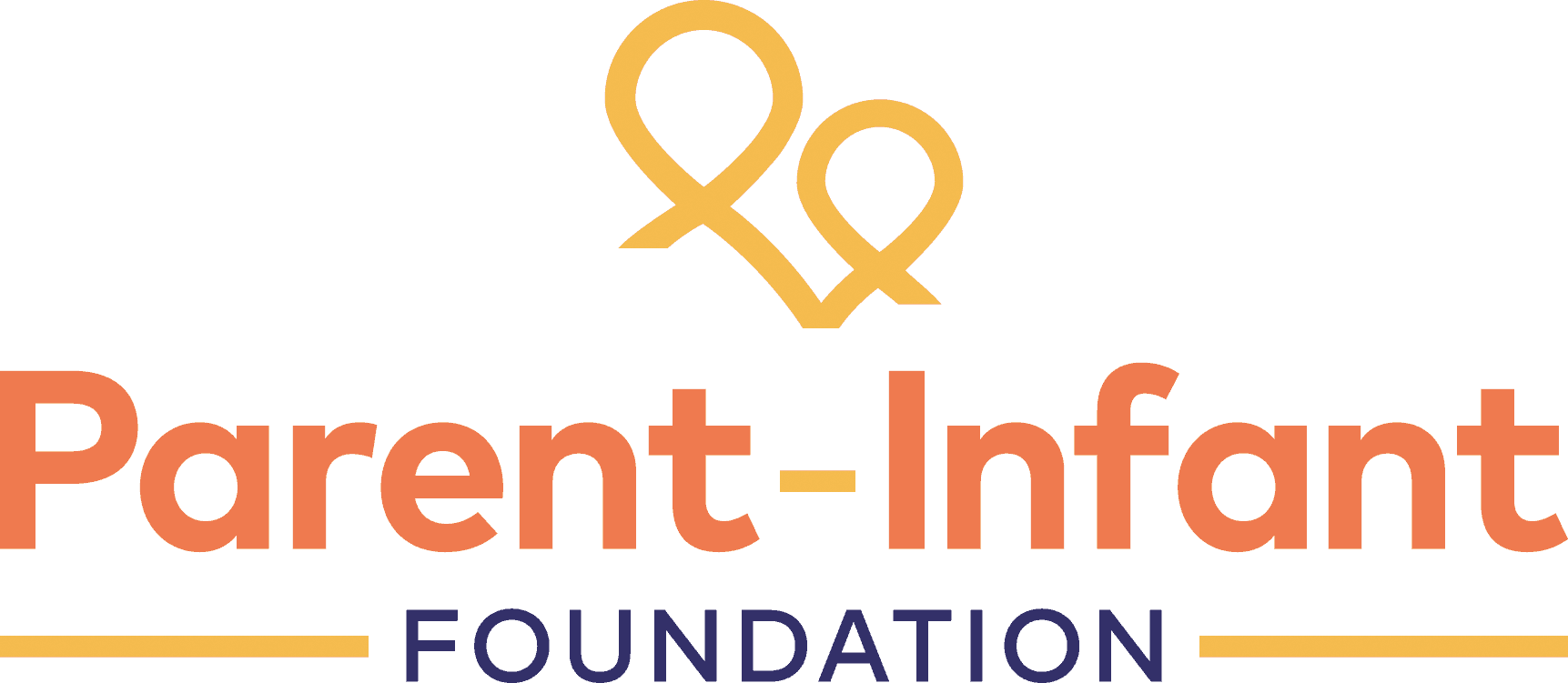New toolkit aims to increase support for parent and infant relationships across the UK
21 February 2023

A new resource just launched by The Parent-Infant Foundation and Newcastle University, which aims to address a huge gap in support services for parents and babies across the UK, has been welcomed by the Rt Hon. Dame Andrea Leadsom DBE MP.
The ‘Parent-Infant Relationships (PAIR) Services Commissioning Toolkit’, developed by the Parent-Infant Foundation and Newcastle University, will make it easier for health, social care, and early years commissioners to put parent-infant relationship services in place in their local area, and improve access to early support for parents and their babies.
The project has been funded by the National Institute for Health and Care Research (NIHR) Applied Research Collaboration (ARC) North East and North Cumbria (NENC).
Parent-infant relationship services can support parents to develop a bond with their baby and address relationship difficulties, as early as possible. However, access to parent-infant specialised teams across the country is patchy, with less than 40 in England and significant gaps across the country.
The new toolkit aims to address these gaps in the system, by supporting local commissioners to put parent-infant relationship services in place.
Rt Hon. Dame Andrea Leadsom DBE MP, who led the Government’s Early Years Healthy Development review, has welcomed the launch of the new toolkit, and said:
“I am delighted to see the launch of the Parent-Infant Foundation and Newcastle University’s Toolkit for Commissioners. It usefully collates research, practical advice and information, to help those setting up parent-infant relationship services, and comes as the government has made fresh announcements on the rollout of the Best Start for Life Vision, which includes £100 million of support for infant and perinatal mental health.
“The building blocks for good lifelong physical and emotional health are laid from conception to age two, so investment in those early months and years can be incredibly effective. This toolkit helps commissioners navigate the evidence and make decisions that work for their local populations’ needs.”
The Toolkit is aimed at anyone with responsibility for commissioning services which promote and strengthen parent-infant relationships.
It will be an especially useful resource for local authority early years commissioners, including those who received the Government’s Family Hubs and Start for Life funding in 2022.
Underpinned by evidence and research
The research-informed toolkit offers a ‘one-stop-shop’ for commissioners; providing background, evidence, practical advice, and information needed to commission and set up parent-infant relationship services in their area.
The development of the toolkit has been led by the Parent-Infant Foundation and academics from Newcastle University. The team worked closely with commissioners of early years and mental health services, as well as service-user parents, to develop the toolkit.
The conversations with commissioners highlighted issues such as a limited understanding of the importance of babies’ mental health and ambiguous use of language around services which could lead to confusion.
There were also calls for a better understanding of the evidence-base for specialist parent-infant mental health teams, and more information about the evaluation of existing services.
A practical tool to put services in place
Dr Karen Bateson is an independent child psychologist with extensive experience of early years mental health and intervention. She has led the development of the toolkit on behalf of the Parent-Infant Foundation.
She said: “I have seen first-hand the positive impact that parent-infant relationship teams can have for both parents and babies, and ultimately transforming that baby’s future life chances. However, the lack of provision across the country is a cause for concern. We hope this toolkit will support commissioners in a very practical way to put these vital services in place, in their local areas.”
Dr Bronia Arnott, from Newcastle University co-led the project. She said: “We were keen to co-develop this toolkit as we could see the evidence of the impact of parent-infant relationship services where they were available, but also the huge gaps in provision.
“This toolkit aims to support access to more parent-infant relationship services across the country, reducing inequalities and ultimately ensuring more infants and families get the support they need during such a critical period of child development. We hope that by working together to create this resource it will help parents and babies, and ultimately help to close the gaps in services.”
Keith Reed, Chief Executive Officer at the Parent-Infant Foundation, said: “This research really got to the core of the way commissioners think and the reasons they might not be inclined to invest in specialised parent-infant relationship teams. We saw that there was a will to support babies wellbeing and mental health, but not always the clear way to do so.
“This toolkit fills so many gaps and we hope that it will be hugely helpful in encouraging commissioners to bring these teams to their areas. Our aim is to create more support for babies and their families, so they can grow up having nurturing relationships that lay the foundation for lifelong mental and physical health.”
‘The help was invaluable’ – A case study
Stacey is a mum from Newcastle who has been supported by a parent-infant relationship team and was involved in the research project.
She said: “The help I received during the end of my pregnancy and for the first year of my little one’s life was invaluable. As someone who has faced trauma previously and a miscarriage as well as a difficult childhood, I was incredibly concerned about my mental wellbeing and how I would bond with my child, if at all, once she was born. The service showed me that I could break the cycle and provide a better and happier life for my own child. It also provided me with an outlet to express my feelings and concerns without feeling judgement.
“I received help for longer than the normal time period, this was due to my therapist understanding that short term help hadn’t actually helped long term, in the past. To be understood and have that support during an incredibly stressful time with not only pregnancy but the Covid pandemic certainly changed what could have been a very different outcome without that support.”
You can access the toolkit on the Foundation website here.
ENDS
Further information about the project
Parent-infant relationship services work with parents to help them develop loving, supportive relationships with their babies. They work with families from conception until the child’s second birthday – a key time for babies’ brain development, especially for laying down mental health foundations including around attachment, bonding, and communication.
A report by the Parent-Infant Foundation in 2019 described parent-infant partnership teams as ‘rare jewels’ in the healthcare system and set out the evidence around why the teams are key to babies’ mental wellbeing. The report also set out the longer-term societal impacts of supporting good mental health at the earliest possible age, and the role that parent-infant relationship services can play in achieving this.
A key part of co-developing the toolkit was to carry out research with early years commissioners to gather their views and experiences around putting specialist parent-infant teams in place in their local areas, including potential barriers.
It is the role of commissioners to review the needs of people who live in an area, and make sure that services are available and appropriate to meet those needs. They have to balance quality and value for money with what needs to be achieved, and often have competing demands and within limited budgets.
The research with commissioners highlighted issues such as a limited understanding of the importance of babies’ mental health and an ambiguous use of language around services which could lead to confusion. There were also calls for a better understanding of the evidence-base for specialist parent-infant mental health teams and more information about the evaluation of existing services.
Funding was also a key barrier, alongside concerns about commissioning services that may not be sustainable in the long run.
The commissioners then worked with the project team to address these issues through the development of the new toolkit.
Existing service users were also closely involved in the development of the toolkit. A group of mums who had been supported by the Newcastle-based ‘Little Minds in Mind’ Parent-Infant Partnership. were actively involved in the project. They shared stories of their real-life experiences of the challenges they’d faced, the support they’d received and the difference it made, with the research team. Their stories were then developed into anonymous vignettes which were shared during development workshops with commissioners.
